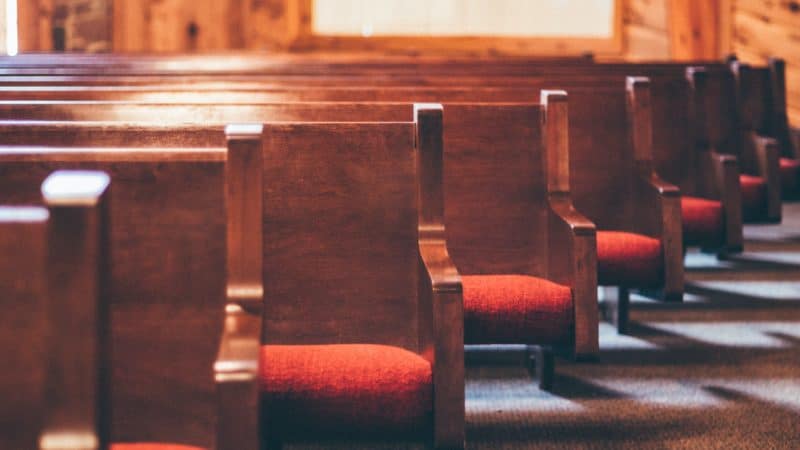When you think of the word “church,” what comes to mind? Is it a building with stained glass windows? Is it people dressed up, congregating to sing hymns?
The Church, as Scripture defines it, has little to do with a building at all. The collective Church refers to the family of believers in Christ. And Seventh-day Adventists consider this belief to be central to their mission in sharing the gospel and being of service to one another.
We will look to the Bible to find out more about:
- The definition of The Church from Scripture
- Who’s in charge of the church
- How the Bible uses metaphors for the church to explain its purpose and meaning
- The Church during the End Times
- How to uplift God’s body of believers
Belief 12: The Church
The church is the community of believers who confess Jesus Christ as Lord and Saviour. In continuity with the people of God in Old Testament times, we are called out from the world; and we join together for worship, for fellowship, for instruction in the Word, for the celebration of the Lord’s Supper, for service to humanity, and for the worldwide proclamation of the gospel. The church derives its authority from Christ, who is the incarnate Word revealed in the Scriptures. The church is God’s family; adopted by Him as children, its members live on the basis of the new covenant. The church is the body of Christ, a community of faith of which Christ Himself is the Head. The church is the bride for whom Christ died that He might sanctify and cleanse her. At His return in triumph, He will present her to Himself a glorious church, the faithful of all the ages, the purchase of His blood, not having spot or wrinkle, but holy and without blemish. (Gen. 12:1-3; Exod. 19:3-7; Matt. 16:13-20; 18:18; 28:19, 20; Acts 2:38-42; 7:38; 1 Cor. 1:2; Eph. 1:22, 23; 2:19-22; 3:8-11; 5:23-27; Col. 1:17, 18; 1 Peter 2:9.)

What is the church, as defined by Scripture?
The Bible tells us the church is the community of believers who confess Jesus Christ as Lord and Saviour. In fact, the word “church” comes from the Greek word ecclesia which means “an assembly of people.”
“For where two or three are gathered in my name, there am I among them” (Matthew 18:20, ESV).
Acts 20:28 describes this “church of God” as the people who Jesus “obtained with His own blood” (ESV), meaning those who have accepted that Jesus died for them to save them.
God is a relational God, and He knows the benefits a strong faith community can bring to each person. It helps us grow in our faith while we also learn more about working together and appreciating the uniqueness of each person.
The Bible also gives the church community of believers guidelines on how they are to relate to and lift one another up.
Those in the Church can support each other by:
- Loving one another (1 John 4:11)
- Fellowship (Hebrews 10:24-25)
- Encouraging one another (1 Corinthians 14:26)
- Praying for one another (Galatians 6:2)
It’s important to remember that being a part of a community of any kind can be challenging. No one is perfect and imperfect people make mistakes. Misunderstandings and conflicts can lead church members to feel hurt, sad, or misunderstood.
But it’s through the trials of learning to work together that the people of God grow in accordance to His purpose. Through prayer and compassion—and even pain and sorrow—God teaches us how to love each other better.
“Iron sharpens iron, and one man sharpens another” (Proverbs 27:17, ESV).
“Be kind to one another, tenderhearted, forgiving one another, as God in Christ forgave you” (Ephesians 4:32, ESV).
God doesn’t just call individuals to work on their own for the kingdom of Heaven. He calls the church community as a whole to work together. Church members can do so much more to spread the gospel when they work together.
Some of the various functions of the church are:
- Teaching (Colossians 3:16)
- Hold each other accountable (Galatians 6:1-2)
- Communion (1 Corinthians 11:26)
- Prayer and praying for one another (James 5:16)
- Evangelism (Matthew 28:19-20)

Who is in charge of the church?
Is it the pastor? Church leaders? Church members?
These people all play a vital role in the church and the life of the church’s ministry. Their leadership is needed and useful.
But the ultimate authority of the church is Jesus Christ, who is the cornerstone of the church.
“This Jesus is the stone that was rejected by you, the builders, which has become the cornerstone” (Acts 4:11, ESV)
“So then you are no longer strangers and aliens, but you are fellow citizens with the saints and members of the household of God, built on the foundation of the apostles and prophets, Christ Jesus himself being the cornerstone, in whom the whole structure, being joined together, grows into a holy temple in the Lord.
In him you also are being built together into a dwelling place for God by the Spirit” (Ephesians 2:19-22, ESV).
In the New Testament, Jesus established the church. The apostles were given a place of leadership and authority.
“And he gave the apostles, the prophets, the evangelists, the shepherds and teachers, to equip the saints for the work of ministry, for building up the body of Christ” (Ephesians 4:11, 12, ESV).
Jesus is the foundation of the church. Any church not built on the Lord, and following His Word, is not Christ’s church. Furthermore, any church or building not established by the Lord is built in vain. The people’s labor is for nothing.
“Unless the LORD builds the house, those who build it labor in vain. Unless the LORD watches over the city, the watchman stays awake in vain.” Psalm 127:1, ESV).
However, God wants to teach us about loving leadership as well. That’s why He sends the Holy Spirit to us, who gives us spiritual gifts we can use for the building up of His Church.
The early church recognized the need for this leadership among their community to further the gospel commission. Prayerfully, they made the decision to delegate various ministry jobs to members of the church with such gifts (Acts 6:1-6).
The early church grew and so did its organization. But the authority of the church and church leaders always remained in Jesus Christ
“Religion that is pure and undefiled before God, the Father, is this: to visit orphans and widows in their affliction, and to keep oneself unstained from the world” (James 1:27, ESV).
Want to learn more about the church and its foundation in Scriptures? Sign up for one of our free online Bible Study Lessons. Begin Today!

Biblical metaphors for the church
The church is the bride of Christ.
With Christ represented as the bridegroom (Matthew 9:15, Matthew 25, Mark 2:19, John 3:29), many places in the Bible refer to the Church as His Bride. This represents the ultimate love He has for His church of believers.
The joy and commitment of a marriage is the kind of care and dedication Jesus has for all of us.
And just as a bride prepares herself to meet her groom at her wedding, so the Church prepares itself for the Second Coming of Christ.
“Let us rejoice and exult and give him the glory, for the marriage of the Lamb has come, and his Bride has made herself ready” Revelation 19:7-9, ESV).
“For your Maker is your husband, the LORD of hosts is his name; and the Holy One of Israel is your Redeemer, the God of the whole earth he is called” (Isaiah 54:5, ESV).
“…Come, I will show you the Bride, the wife of the Lamb” (Revelation 21:9, ESV).
“He who has the bride is the bridegroom; but the friend of the bridegroom, who stands and hears him, rejoices greatly because of the bridegroom’s voice. …” (John 3:29, NKJV).
This metaphor is taken a step further in the parable Jesus tells about the ten virgins waiting for the bridegroom.
Five of these women were wise, the other five were foolish. The bridegroom was delayed in his arrival, and while the ten virgins waited they became tired and fell asleep.
The wise ones brought extra oil for their lamps, and the foolish ones did not. When the arrival of the bridegroom was announced, they all prepared their lamps, and the foolish ones saw they were out of oil.
Since they weren’t prepared, they had to go back into town to buy oil. While they were doing so, the bridegroom arrived and the wedding began, so the door was shut. When they arrived, they were too late. They didn’t get to go to the wedding because they were not prepared (Matthew 25:1-13).
This parable likens the church to the ten virgins awaiting the bridegroom (Jesus). The ones who follow Him, obey His teachings and are actively awaiting His return are the ones He saves. These are the characteristics of His Church, the Bride of Christ.

The church is the body of Christ.
The church as a community of believers is described as the body of Christ. This beautiful metaphor illustrates the diversity of Jesus’ worldwide community of followers. It also shows how each member of the church is important.
Each Christian has a role to play in God’s work. Everyone has been given unique talents and special gifts they can use in their own ministry.
If the church is the body of Christ, we see that Jesus is the head and each believer is a different member of the body.
“And he is the head of the body, the church…” (Colossians 1:18, ESV).
“For as the body is one and has many members, but all the members of that one body, being many, are one body, so also is Christ. … Now you are the body of Christ, and members individually” (1 Corinthians 12:12, 27, NKJV).
“From whom the whole body, joined and held together by every joint with which it is equipped, when each part is working properly, makes the body grow so that it builds itself up in love” (Ephesians 4:16, ESV).
“For the body does not consist of one member but of many. If the foot should say, “Because I am not a hand, I do not belong to the body,” that would not make it any less a part of the body” (1 Corinthians 12:14, 15, ESV).
Just as the body needs each organ to survive, each part of the Body of Christ is essential as well. This is to illustrate that every person, no matter their gifts or talents, is valuable and has a purpose in the Church.
The church is the family of God.
The word “family” is defined as a unit of people who, through marriage, birth, or adoption, are bonded together. Traditionally the nuclear family is made up of two parents and one or more children. But family looks different for different people.
In the Bible the church is called the family of God. God is described as our Father. Fellow Christians are described as our brothers and sisters in Christ.
“So then you are no longer strangers and aliens, but you are fellow citizens with the saints and members of the household of God,” Ephesians 2:19, ESV).
“So then, as we have opportunity, let us do good to everyone, and especially to those who are of the household of faith” (Galatians 6:10, ESV).
“And stretching out his hand toward his disciples, he said, “Here are my mother and my brothers! For whoever does the will of my Father in heaven is my brother and sister and mother” (Matthew 12:49, 50, ESV).

What the Church will be like near the End Times
As the world descends into turmoil as things get closer to the Second Coming of Christ, the Church will be God’s faithful people who hold onto His teachings.
Even while the rest of the world distances themselves from God, those in God’s Church remain faithful to Him. They will stand out as holy among the wickedness of the world.
“… It is these who follow the Lamb wherever he goes. These have been redeemed from mankind as firstfruits for God and the Lamb” (Revelation 14:4, ESV).
We are told that Jesus will “present the church to Himself in splendor” (Ephesians 5:27, ESV) when He returns to earth.

Uplifting God’s body of believers
The biblical view of the church is a vital doctrine and is very important to Adventists. Jesus Christ is what makes the idea of “the church” work in the first place. Without Jesus as the cornerstone of our church, all our work would be in vain.
When you visit an Adventist church, you are likely to find a group of believers who welcome you with open arms. The goal of every Adventist church is to be a place where believers encourage one another to live each day for Jesus.
Each Adventist church is unique in the way they serve their communities and church members. But, you will find some common themes in most Adventist churches:
- Praying with one another
- Studying the Bible together
- Planning outreach activities
- Organizing children’s activities
- Collecting donations for families in need
- Gathering together for worship and prayer
Jesus is the reason we are a church. He’s why we strive as a denomination to foster a community of believers who love, support, and encourage one another. And all this is to help our friends find freedom, healing and hope in Jesus.
Ready to start Bible studies and discover Scripture for yourself?
Want to learn more about the Church, its foundations in Scripture origin, and future? Check out our range of Bible studies and begin learning today.



Christianity and the Church in the twenty-first century
Some time ago, I was asked to be the guest speaker at the annual gathering of a local chapter of a n…
Read More
Do Christians Still Need Church Today?
Why busy moderns (and postmoderns) still need the church
Read More
God’s Anointing for Unity
“Behold, how good and how pleasant it is for brethren to dwell together in unity! It is like the pre…
Read More
Why bother with church?
Of course, I believe in Jesus,” Tom said. He shrugged. “I just don’t see the need…
Read More
The Bad News . . . and Good News
“I have bad news,” the ER doctor said. I almost thought he was kidding. OK, so you have good news an…
Read More